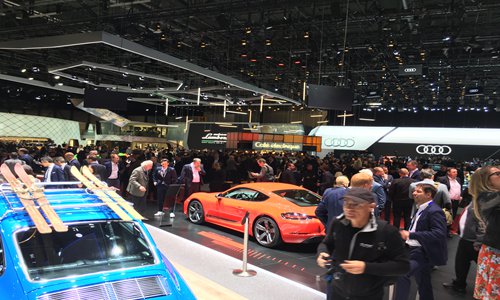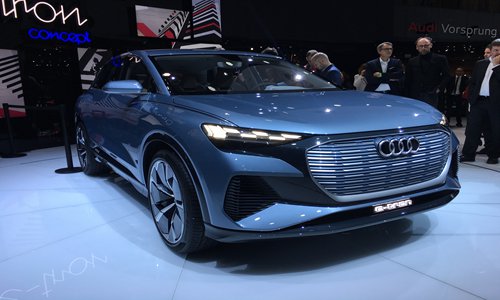Electric mobility shines at Geneva
Premium carmakers including Audi launch models to tap into booming market

The exhibition center of Geneva International Motor Show on Tuesday. Photo: Tu Lei/GT

Inset: Audi Q4 e-tron shown on the Geneva International Motor Show on Tuesday.Photo: Tu Lei/GT
Before the opening of the 89th Geneva International Motor Show, many industry insiders forecast that the event would feature electric mobility.
Under the global trend toward electrification, Geneva, the birthplace of the auto industry in Europe, and one of the most exciting displays of auto innovations in the world, is facing new breakthroughs and changes.
The show, which fell on Tuesday local time, drew many players such as Volkswagen, Audi, Mercedes-Benz and Skoda as well as two Chinese brands, BAIC and AIWAYS. They brought their new concept products to the shores of Lake Geneva, and all of these concept vehicles are related to electrification.
"Electric mobility will transform the automotive business," Bram Schot, board chairman of AUDI AG, said at the ceremony. "2019 is the year of plug-in hybrids made by Audi. With these plug-in hybrids and our e-models, we are covering the whole range of our portfolio."
According to him, the company will offer 12 all-electrified models by 2025, and the sales is expected to account for one third of all vehicle sales in the world.
The determination is echoed with the Volkswagen Group's plan, as by 2025, nearly one-quarter of the group's entire lineup is expected to be electric.
Audi brought four all-electric drive vehicles to the show - the e-tron GT, e-tron Sportback, e-tron FE05 and Audi Q4 e-tron - providing a glimpse of the next stage of the company's electric mobility.
The Q4 e-tron made its global debut during the show. It can accelerate from zero to 100 km/h in just 6.3 seconds, and reach its maximum speed at an electronically limited 180 km/h.
The battery in the vehicle floor stores 82 kilowatt hours, which allows for a range of more than 450 kilometers according to the WLTP standard.
The battery is charged with a maximum of 125 kilowatts. As a result, it takes about 30 minutes to return to 80 percent of the total capacity.
The company said the Audi e-tron, the brand's first electric production model, will be delivered to European customers soon. In terms of the Chinese market, the e-tron will be introduced as an imported car later this year. Production will be localized next year, Audi China President Thomas Owsianski told the Global Times on Tuesday.
Audi not alone
Mercedes-Benz, although it has a smaller range of new-energy vehicles than Audi or BMW, brought its fully electric Concept EQV, reflecting the company's determination to enter the multi-purpose vehicle (MPV) market segment after the pure electrification of the sport utility vehicle (SUV).
Unlike Mercedes-Benz and Audi's pure electric strategy, BMW has chosen a different path in the new-energy vehicle (NEV) market.
At the auto show, BMW launched six plug-in hybrid models including the BMW 5 Series and the new BMW 7 Series.
The company plans to have 12 NEVs by the end of 2019, increasing to at least 25 models by 2025.
Even super-luxury sportscars have joined the "powered army." It's a fact that global NEV sales have gained momentum.
In 2018, the market for electrically chargeable vehicles in the EU expanded by 38 percent to 301,847 units. The sales of battery electric cars grew even faster by 48 percent to 201,000, according to the website best-selling-cars.com.
China, a hub for global electric vehicle sales, also witnessed a boom. Sales reached 96,000 in January this year, an increase of 138 percent. Among this group, sales of pure electric passenger vehicles reached 85,000, an increase of 188.5 percent, figure from the China Association of Automobile Manufacturers showed.
South China's Hainan Province will completely ban the sale of fuel-engine vehicles from 2030 and begin to study fuel vehicle control regulations around 2025, according to an NEV development plan released on Tuesday.
Audi aims to be the leader of the NEV world, and Audi will introduce electric models that are dedicated for China, the world's largest auto market, Owsianski said.
Figures from Audi show that in the Chinese market, the company set another record in 2018, with sales of 663,049 units, a year-on-year increase of 10.9 percent. Over the past decade, Audi's sales in China have grown more than fourfold.

